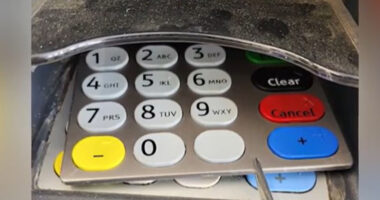A COUPLE who tried to donate $20 to a man’s funeral fund ended up in the hospital after their charitable act ended in a violent scuffle.
Drew and Leilani, a couple hailing from Chicago, Illinois, found themselves in a predicament after utilizing tap-to-pay to assist a stranger they encountered at Target.


During December, two individuals approached Drew and requested a $20 contribution, explaining that the funds were needed to lay their deceased little brother to rest, as shared by Drew in an interview with CBS affiliate WBBM.
They offered $20 in cash, but the scheming duo refused and asked for digital payment instead.
Even though Drew and Leilani thought their request was odd, they were in a “giving mood” and decided to use a credit card.
However, their bank denied the transaction.
Drew then asked the panhandlers if he could pay through Apple Pay, and they agreed.
When Drew tapped his phone to make a $20 payment, he was shocked to discover he had been charged $4,5000 instead.
“I looked down at my phone and realized that they took close to $5,000 instead of $20,” Drew said.
“I said to myself, ‘Oh, hell no,’ and turned and started chasing them.”
Drew raced to pin down the scammers while Leilani called the police.
He wrestled with one of the men who was getting into a car in the Target parking garage.
Drew desperately clung to the man as he slammed on the gas and weaved through rows of parked cars in the Target lot.
Eventually, the heartless criminals threw Drew from the vehicle, causing him to slide about 20 to 30 yards before crashing into the back of a truck.
The horror crash left Drew with a fractured right rib, a punctured right lung, and a mountain of hospital bills.
Thankful that he’s alive but traumatized by the incident, Leilani had a defiant message for the scammers who got away.
“You’re hurting more people than you think you are,” the heartbroken woman said.
“It’s not worth hurting all those people.”
TAP-TO-PAY SCAM
Tap-to-pay is a convenient method of contactless payment through mobile phones, enabling users to specify an amount on their device and receive payment from another phone by a simple tap.
Bank tips for avoiding scams

As scams become more sophisticated with the use of artificial intelligence, it is important you know how to spot a scam:
- Be skeptical of online deals that seem too good to be true, especially on social media.
- Scammers will often use tactics to make you panicked so you make quick decisions – be cautious if you are told to take immediate action and verify who has contacted you.
- Chase Bank warns customers to “never return any unexpected funds without calling Chase first.”
- Never send money to someone you have only spoken to online or by phone as this is likely a romance scam.
- Unless you 100% know who you are talking to, never give someone remote access to your device.
- Never accept help from strangers at an ATM and always be vigilant when making withdrawals.
- Do not send money or click any links indicating that you have won a prize.
Source: Chase.com
Contactless payment apps like Apple Pay enable users to pay by holding their phone close to a terminal or another phone, making transactions quick and easy.
In Drew and Leilani’s case, the scammers punched in $4,500 instead of $20.
Drew was able to dispute fraudulent charges and was refunded the entire amount.
Meanwhile, no arrest has been made in the case so far.
The US Sun reached out to Target but hasn’t received any response yet.
Consumers are advised to be careful when they make a contactless payment.
It’s key to always be sure to check the price punched in before tapping your phone.
If someone on the streets asks for a donation, offer them cash, and if they refuse, then walk away.



















